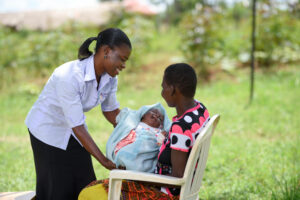Tackling Malaria for a More Equitable World

Janet with clients in Uganda.
“Half of the people in my community have gotten malaria. Many children have had to stop going to school and people have lost their jobs because they got sick. This has made the already high levels of unemployment and poverty even worse. The worst part is it’s one of the deadliest diseases we face. Vulnerable groups are especially at risk.” – Mentor Mother Janet, who is employed as mothers2mothers (m2m) community health worker in Uganda, one of four countries that together account for just over half of all malaria deaths in the world.
Today is World Malaria Day, a day to raise awareness about the devastating and unequal impact of this life-threatening parasitic disease. Malaria disproportionately impacts vulnerable and marginalised communities and populations, and is most prevalent in sub-Saharan Africa—which according to the World Health Organization (WHO) accounts for 94% of malaria cases and 95% of malaria deaths globally.
It is also a day to join the WHO’s call to “accelerate the fight against malaria for a more equitable world.” To advance that goal, m2m is committed to expand services to improve access to malaria prevention, diagnosis, and treatment, particularly for high-risk clients in malaria-endemic countries. This is driven by our 2022-2026 strategic plan that is leveraging our proven peer-led model to respond to the urgent and growing health needs of the communities m2m serves.
Devastating and Unequal Impact
Despite being preventable and treatable, malaria is responsible for 500,000 deaths each year in sub-Saharan Africa, with 80% of deaths occurring among children under five. Approximately 36% of pregnant women in sub-Saharan Africa (12.7 million) were exposed to malaria infection in 2022, placing both mothers and infants at risk. Living with HIV increases the risk of a more severe malaria infection, and the disease is also associated with an increase in the viral load of people living with HIV. Children under age five, and pregnant women are also more vulnerable to severe infection
m2m’s Response
With malaria endemic in most of the countries where we work, m2m has integrated malaria prevention and treatment into our primary health care services in countries where we operate with the highest burden, including Angola, Ghana, and Uganda. Mentor Mothers, like Janet—who was fortunate to survive malaria herself—educate clients about malaria and how to prevent it, including sleeping under insecticide-treated mosquito nets and clearing bushes and stagnant water around their homes.
Additionally, Mentor Mothers facilitate the distribution of insecticide-treated nets, undertake pre-screening for malaria among children and pregnant women, make referrals for further diagnosis and treatment, and support clients to adhere to anti-malarial treatment. Where available, m2m also educates and refers for the malaria vaccine for children under age five which has been shown to decrease early childhood death by 13%. In some countries, our teams can support early diagnosis with rapid diagnostic testing, ensuring timely treatment and improving malaria outcomes.
m2m has made significant strides in tackling malaria where we offer these services. Between 2020-2022, we:
- Reached 400,806 clients with comprehensive prevention education, including malaria awareness.
- Provided insecticide-treated nets to 98% of those found to be eligible—approximately 25,000 women.
- Screened and linked over 20,000 pregnant women to preventative therapy.
- Ensured 1,707 children in Malawi received the malaria vaccine in 2023 alone, through demand creation and linkage activities.
For Janet, the reward is seeing people in her community stay healthy and thrive. “It’s fulfilling to know that our efforts are making a positive difference in people’s lives. When people are healthy and malaria-free, they can go to work, small businesses can remain open, and children can attend school regularly. This leads to a more productive workforce, thriving businesses, and a brighter future for the community as a whole,” says Janet.
To stay up to date on m2m’s progress in tacking malaria and other critical health conditions, follow us on social media: Instagram, Facebook, LinkedIn, and X.






















